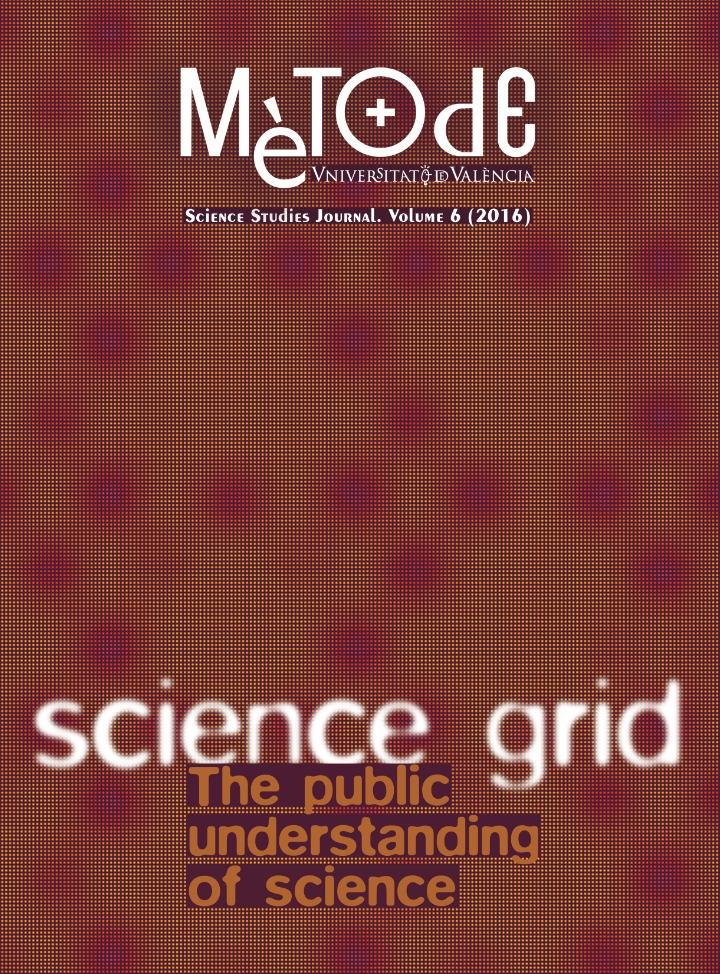Analysis of health communication texts: UK press coverage of debates about assisted dying
DOI:
https://doi.org/10.7203/metode.6.6886Keywords:
media texts, data analysis, computer assisted analysis, keyword analysis, text mining Abstract
Abstract
Conventionally, social researchers analyse media messages by reading text and coding it. This is time consuming and restricts many studies to small samples. Nowadays very large amounts of text are available in electronic form, offering potential insights into the health messages they contain, but which appear daunting to the analyst with limited resources using conventional methods. I explain and illustrate methods for the computer-assisted analysis of media texts, using specialised software (Wordsmith Tools and Wordstat). These allow the analyst to provide a statistical overview of the key features of texts, to compare them (looking at change over time, for example) and to select illustrative quotations that epitomise the trends identified.
 Downloads
Downloads
 References
References
Eaton, L. (2009, 12 October). Trial that pays patients to take antipsychotic drugs comes under attack. British Medical Journal, 339, b4202. doi: 10.1136/bmj.b4202
Hall, C. (2007, January 27). NICE wants incentives for addicts days after refusing cancer drug. The Daily Telegraph, p. 8.
Parke, H., Ashcroft, R., Brown, R., Marteau, T. M., & Seale, C. (2013). Financial incentives to encourage healthy behaviour: An analysis of UK media coverage. Health Expectations, 16(3), 292–304. doi: 10.1111/j.1369-7625.2011.00719.x
Seale, C. (2005). Portrayals of treatment decision-making on popular breast and prostate cancer web sites. European Journal of Cancer Care, 14(2), 171–174. doi: 10.1111/j.1365-2354.2005.00544.x
Seale, C. (2006). Gender acommodation in online cancer support groups. Health, 10(3), 345–360. doi: 10.1177/1363459306064495
Seale, C. (2008). Mapping the field of medical sociology: A comparative analysis of journals. Sociology of Health and Illness, 30(5), 677–695. doi: 10.1111/j.1467-9566.2008.01090.x
Seale, C., Boden, S., Lowe, P., Steinberg, D., & Williams, S. (2007). Media constructions of sleep and sleep disorders: A study of UK national newspapers. Social Science and Medicine, 65(3), 418–430.
Seale, C., & Charteris-Black, J. (2008a). The interaction of class and gender in illness narratives. Sociology, 42(3), 453–469. doi: 10.1177/0038038508088835
Seale, C., & Charteris-Black, J. (2008b). The interaction of age and gender in illness narratives. Ageing and Society, 28(7), 1025–1043. doi: 10.1017/S0144686X0800737X
Seale, C., & Charteris-Black, J. (2010). Keyword analysis: A new tool for qualitative research. In I. L. Bourgeault, R. DeVries, & R. Dingwall (Eds.), The SAGE handbook of qualitative methods in health research (pp. 536–556). London: SAGE.
Seale, C., Charteris-Black, J., Dumelow, C., Locock, J., & Ziebland, S. (2008). The effect of joint interviewing on the performance of gender. Field Methods, 20, 107–128. doi: 10.1177/1525822X07313837
Seale, C., Charteris-Black, J., & Ziebland, S. (2006). Gender, cancer experience and internet use: S comparative keyword analysis of interviews and online cancer support groups. Social Science and Medicine, 62(10), 2577–2590. doi: 10.1016/j.socscimed.2005.11.016
Shearer, A. (1969, 30 April). Elderly should be «allowed to die». The Guardian, p. 5.
Shepherd, E., & Seale, C. (2014). Eating disorders in the media: The changing nature of newspaper reports. European Eating Disorders Review, 18(6), 486–495. In K. Eli, & S. Ulijaszek (Eds.), Obesity, eating disorders and the media (pp. 91–106). Farnham: Ashgate.
South Wales Echo. (2009, 30 April). New grant for mums-to-be. South Wales Echo, p. 9.
Street-Porter, J. (2008, 13 November). What we really need to solve our obesity epidemic. Belfast Telegraph, p. 36.
The Guardian (1935, 5 September). Problem of human suffering: Scientific euthanasia. Doctor urges its adoption. The Guardian, p. 6.
Downloads
Published
How to Cite
-
Abstract1085
-
PDF403
Issue
Section
License
![]()
All the documents in the OJS platform are open access and property of their respective authors.
Authors publishing in the journal agree to the following terms:
- Authors keep the rights and guarantee Metode Science Studies Journal the right to be the first publication of the document, licensed under a Creative Commons Attribution-NonCommercial-NoDerivatives 4.0 International License that allows others to share the work with an acknowledgement of authorship and publication in the journal.
- Authors are allowed and encouraged to spread their work through electronic means using personal or institutional websites (institutional open archives, personal websites or professional and academic networks profiles) once the text has been published.





